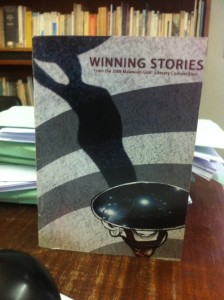ANTHOLOGY: Winning Stories from the 2008 Malawian Girls’ Literary Competition
REVIEWED BY: Makewana’s Daughters
In 2008, a team comprising of the Malawi Writers Union (MAWU) and Stephanie Bosch from Cambridge organized a writing competition for girls in Malawi. The reason for this competition was to encourage girls to express themselves through literature.
The result of this collaboration was an anthology whose themes are a reflection of the way in which the writers view their society, as well as the way in which they feel girls are regarded in that society.
Take, for instance, the winning short story in English , “Nambewe the Heroine”, by Pamela Mithi, who was a seventeen-year old student at Likuni Girls Secondary School at the time. Her story speaks against the custom of forcing teenage girls to sleep with a man known as Fisi (Hyena) after their initiation ceremony. The story is a testament to hard work and determination, especially as Nambewe, the main character, turns her back on this custom and decides to pursue her education with the support of her teacher, Mrs. Banda. It is a story which covers a span of several years within a few pages, but drives home the importance of education.
Similarly, the winning entry in the Chichewa category, “Nadziona Mwana wamasiye” by Clara Chikuni, tackles the issue of upbringing, especially in cases where parents do not equip their children with skills for life. The story is about Ndaziona and the struggles she faces in life. Chikuni’s story is rich in figurative expressions as well as proverbs. For instance, in order to describe Ndaziona’s family and the way in which they used to be one of the best dressed families in the area, she employs the following proverbs, “Nkhwani saotchera, jekete sapisira” (Literally, ‘You do not roast pumpkin leaves, nor do you tuck in a jacket”. These are expressions used locally when one wants to indicate that s/he is being honest and is not exaggerating anything). This is another story which highlights the importance of education.
In addition to the importance of education, other dominant themes in the anthology include the effects of war( in “Be Careful what you wish for”, by Tiseke Chilima, English second prize winner), the maltreatment of orphans (in Zomwe Chisomo Adawona” by Nthambi Chikuse, Chichewa Second prize winner), beating stereotypes about girls and women (“The Rising Star” by Grace Bandawe, English Third Prize Winner, and “ The Song of Life” by Khama Khomba, English Fourth Prize winner), and an indictment against the sexual abuse of schoolgirls by teachers (“ The Absurd Teacher” by Prisca Ngoma, English Special mention) the sanctity of life ( “Mwana wotayidwa M’chimbudzi” by Linda Mulera,Chichew a special mention and the importance of friendship (in “Peace at Last” by Yewo Bernadette Kajawo, English Special mention).
These are themes which reflect the challenges that the girls observe in their society.
The anthology reflects the girls’ need for a happy ending, as they present characters who prevail against all odds. All the girls who were in included in the anthology were secondary school students at the time of compilation, and several of them indicated that the money would be used for fees. This is a case where one could speak not just about art for art’s sake, but art as a form of expression and as a tool with which to change lives. Such initiatives definitely need to be encouraged.



